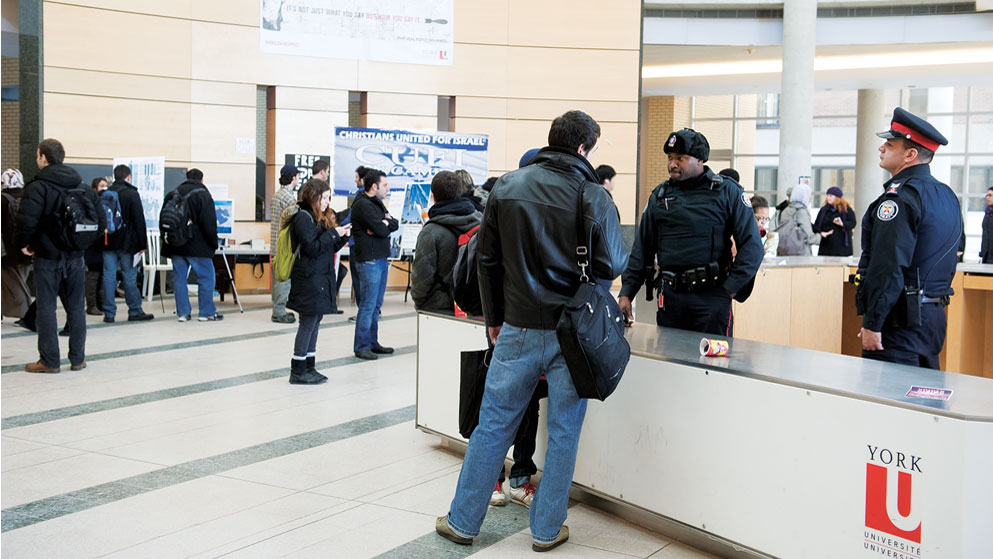How important is the Israeli Apartheid Week (IAW) campaign?
Adonis El-Jamal (Students Against Israeli Apartheid): The stories have been very one-sided in favour of Israel, so this is an important response to that, to try and show the other side of the story and really open the debate. We are talking about a situation of apartheid, or occupation – which is illegal under international law – so you can’t be neutral. Neutrality is something that doesn’t exist in the situation of injustice. So we stand on the side of the oppressed, and you are either for or against injustice – and we are against injustice.
Adir Dishy (Hasbara): The fact that [they] dedicate a whole week to Israel […] highlights how hypocritical the organizers of IAW are, and that’s exactly the purpose of our ‘Free Middle East’ campaign. We’re talking about some of the real human rights violations that happen in the Middle East, such as stoning and beheadings and lashes and things you would never think could happen in 2011.
Josee Chiasson (Christians United for Israel): Israel Apartheid Week, as a title in itself, is very politically charged and it’s very conclusive. It’s already saying Israel is an apartheid state and it’s not allowing any room to debate the issue. In order to have any real dialogue about the politics in the Middle East, we have to label it differently. Maybe it can be ‘Middle East Peace Week’ or ‘Middle Eastern Conflict Week’ or something that is inclusive to different perspectives.
Greg Kay (B’nai Brith): [IAW]’s a completely misguided event that doesn’t allow any room for discussion. It’s an event that singles out Israel and demonizes it while also placing a double standard on Israel. It’s really unfortunate that this has come to creating fake labels that are really offensive to people who have suffered real apartheid, like the South African people. It is completely unfounded and untrue.
What should students know about IAW?
AEJ: The main message for students to get is that this is not some sort of ethnic conflict; it is actually a situation of oppression and injustice. As of right now, the Palestinians of Israel do not have any rights and the occupation must end. People need to look at it and remove some of the filters that are put in place when we get these messages from the mainstream media.
AD: It’s very important to look at IAW and listen to them with a very open mind, but obviously don’t listen to fanatics on either side. The students on this campus that are pro-Israel are not scared of the facts because we know that the facts are on our side. If you really do your research, we know you will come to the same conclusion as us because that’s what we’ve done.
JC: Challenge the status quo. Just because IAW has existed for seven years and it’s the same message every year, that’s the status quo now. It’s still necessary to be able to challenge that and to say we need to change. We need to go from something that doesn’t encourage dialogue to something that is going to include other perspectives about the Middle Eastern conflict and not make people feel defensive or make them feel like they are being isolated or segregated on campus. It’s not too late to take that stance.
GK: Go speak to the groups on campus that are countering the negative message. Learn the facts and realistically you will be able to sift through the biases that these people are presenting to you and you will see that Israel is a vibrant democracy that values human rights and freedom […] Educate yourself before you go on accepting lies by these groups.
What do you think of IAW critics?
AEJ: We are not targeting Israeli people. These are Israeli policies, policies of an Israeli government. It has nothing to do with Jewish people or with religion, and this is one of our main messages. It’s not about being Christian; it’s not about being Muslim and it’s not about being Jewish: it’s about people’s rights. People’s rights are not being respected; [their rights] are being violated on a daily basis. People need to recognize the humanity of others. We are not trying to provoke hatred.
AD: We really think that the pursuit of human rights has really been hijacked at this university and it’s concentrated on demonizing one country while totally overlooking the atrocities that happened in Iran and Saudi Arabia and Libya. Gaddafi is bombing his own people, but nobody wants to talk about that. So in terms of this campaign, I just think IAW is such a joke.
JC: It’s causing a lot of division across campus, so I don’t support the existence of IAW. I think a week [dedicated to] discussing the issues is great, but it shouldn’t be called IAW […] there are all these different accusations against Israel, so automatically anybody else with a different perspective is going to feel defensive about the issue. That’s not good for dialogue either. It is very segregating.
GK: They are trying to demonize, delegitimize and place a double standard on Israel. It’s really unfortunate when you start labeling the only free and democratic country [in the Middle East] with things that are completely unfounded and untrue.

Q&A with Hasbara, Students Against Israeli Apartheid, B’nai Brith and Christians United for Israel





It’s great to see more Israeli advocates coming out from their private newspapers, lobby groups, and exclusive meetings into the open on a grassroots level attempting to engage students by provoking their inquiry.
It’s great to learn that Israeli groups have increased their efforts to engage all Canadians not just themselves and conservative politicians.